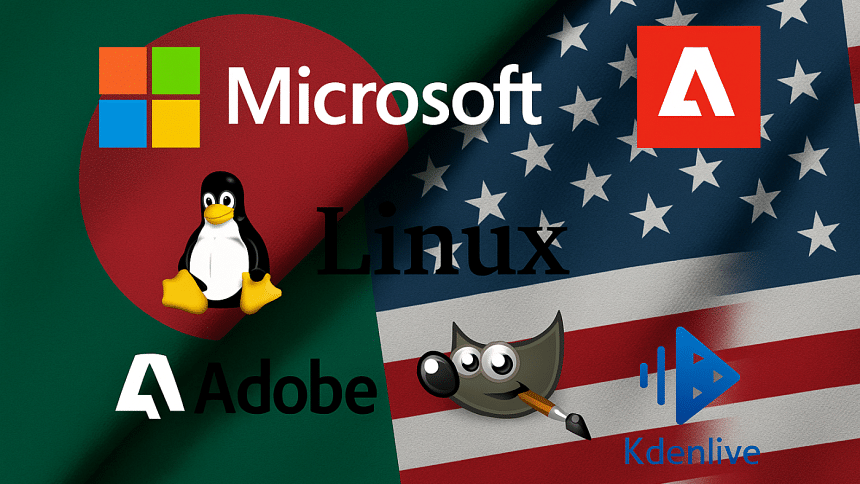Stop software piracy to prevent US tariffs

Trump's proposed 37 percent tariff on Bangladeshi products would have crippled our economy; fortunately, the rate was reduced to a more manageable 10 percent. The original high rates that were proposed seem to have been based on the simplistic, and economically incorrect, notion that countries which have a trade surplus with the US are somehow cheating Americans. Bangladesh does indeed have a trade surplus with the US, but this only means that Americans are, on average, too wealthy to want low-paid jobs in clothing factories that form the basis of Bangladesh's garment industry; and that Bangladeshis are, on average, too poor to consume much in the way of expensive goods such as the Tesla cars that America does manufacture. Unfortunately, we are not out of danger; this sort of erratic US policymaking is likely to be the norm for the next four years. In the face of such risks, Bangladesh needs to take precautions to stay out of the crosshairs of unpredictably punitive US trade authorities. In particular, it would now be prudent to stop piracy of American intellectual property, particularly software.
Pirated software has always been common in Bangladesh; typically, every small shop selling computers generally installs unlicensed copies of Microsoft Windows and MS Office, as well as Adobe Creative Suite (Photoshop image editor, Illustrator graphics, and Premiere Pro video editor) as a "free" service to customers. There are also numerous shops selling pirated software DVDs. Unfortunately, such activity is a violation of the intellectual property rights (IPR) of Microsoft and Adobe, which are US companies whose commercial interests US trade authorities are bound to protect. A quick search on the web reveals that MS Office costs 129 dollars per year per computer, while Adobe Photoshop, Illustrator, and Premiere Pro cost 69 dollars per month, or 828 dollars per year per computer. So, the combined value of all the pirated software in Bangladesh is worth 1,057 dollars per computer per year; for the millions of computers in Bangladesh, this will total billions of dollars per year. This unpaid software piracy liability could be weaponised at any time to impose additional tariffs on Bangladesh. Taking firm action on software piracy is essential to protect Bangladesh's access to the US market.
Piracy of software has always been common in Least Developed Countries (LDCs). US trade authorities generally overlooked this, assuming that LDCs were too poor to be significant markets. However, Bangladesh is about to graduate from LDC status, making it suddenly visible and vulnerable to US trade reprisals for software piracy. This danger should not be underestimated, especially as the Trump administration has shown itself willing to use any real or imaginary pretext to impose punitive tariffs.
In fact, sales of pirated software are illegal under Bangladesh copyright law and should be ended. This is not as hard as it may seem. The most common pirated software, Microsoft Windows and MS Office, can easily be replaced by downloading and installing free/open-source operating systems like Linux Mint (www.linuxmint.com) and free/open-source office software like LibreOffice (www.libreoffice.org) instead of pirated Microsoft products.
Similarly, pirated Adobe Photoshop can be replaced by the free/open-source GIMP photo editor (www.gimp.org), and pirated Adobe Illustrator graphics software can be replaced by the free/open-source Inkscape (www.inkscape.org). Premiere Pro video editor can likewise be replaced by Kdenlive (www.kdenlive.org).
The main barrier to corporate and government migration to free/open-source software is the lack of IT staff trained in the free/open-source Linux operating system; but this is easily remedied by the many Linux certification courses available in Dhaka. All corporate and government IT staff should be required to undertake such training. Then those Linux-trained IT staff can support their organisations to replace pirated software with free/open-source alternatives.
Microsoft and Adobe are billion-dollar corporations with big advertising budgets to increase awareness and adoption of their products; Linux and open-source software do not have comparable budgets and mainly rely on word-of-mouth for increasing adoption. Linux users in the US, EU, India, Pakistan, and Sri Lanka have all created non-profit organisations such as the Free Software Foundation (www.fsf.org), Free Software Foundation Europe (www.fsfe.org), Free Software Foundation India (www.fsf.org.in), Open Source Foundation of Pakistan (osfp.org.pk), and Lanka Software Foundation (www.opensource.lk), which work to promote the use of free and open-source software in those countries. Bangladesh also needs its own organisation to promote free/open-source software.
Stopping software piracy is now imperative. The government should take steps to halt the sale of pirated software in accordance with Bangladesh copyright law. Otherwise, it is only a matter of time before these issues are noticed by US trade authorities and end up costing us dearly.
Kazi Zeeshan Hasan is director at Kazi Farms Ltd.

 For all latest news, follow The Daily Star's Google News channel.
For all latest news, follow The Daily Star's Google News channel. 



Comments